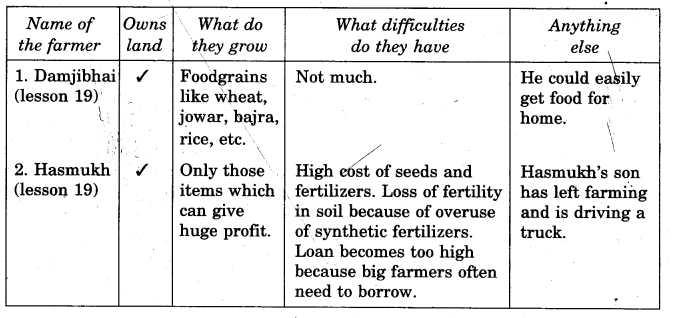NCERT Solutions for Class 5 EVS Chapter 22 On The Move Again
QUESTIONS FROM TEXTBOOK SOLVED
Tell
1.Did all the farmers in Dhanu’s village have their own land?
Ans. No, only some of the farmers in Dhanu’s village have their own land. Some of the farmers work on the lands of big farmers.
2.During what time of the year did Dhanu’s family get work in the village? During what time did they not have work?
Ans. Dhanu’s family gets work from before the rainy season till Dussehra. During
the remaining six months, when there is no rain, they do not get work.
3.Do you know any families like Dhanu’s, who have to leave their villages for months in search of work?
Ans. Yes, I know of many families who have left their villages for months in search of work.
Think and Find Out
1.If people in Dhanu’s village did not leave the village in search of work, what difficulties would they face in their own village?
Ans. If people in Dhanu’s village did not leave the village in search of work, they would face many difficulties. They would not be able to earn enough money to meet even their basic needs like food and clothes. They will not be in a position to afford the cost of education for their children.
2.In Dhanu’s village, there can be no farming when there is no rain. Do you think farming can be done even without rain water? How?
Ans. Yes, farming can also be done without rain water. New methods of irrigation can be used to provide the required water to crops. Canals, tubewells or rahats can be used for irrigating the fields.
Think
1.Dhanu’s family and many others from the village go far away for work but some people stay back in the village. Why does this happen?
Ans. Some people need to stay in the village so that they can protect the houses and cattle. They are also needed to take care of elderly people who prefer to stay back in the village.
2.When Dhanu and other children leave the village for six months, what happens in the village school?
Ans. When Dhanu and other children leave the village for six months, the village school gets students from the families of big farmers only.
3.What arrangements are made at your home for old and unwell family members when everyone goes for work?
Ans. In my home, ladies do not go to work. They stay back and take care of elderly and unwell family members.
Think and Tell
1.Why does Mami wish that Dhanu should go to school for the whole year and study?
Ans. Mami wanted Dhanu to study well and get a good job so that he could work independently. Mami wished Dhanu to become a rich person and_ earn good reputation in the society. Mami did not want Dhanu to suffer like his family members. Hence, Mami wished Dhanu should go to school.
2.What happens when you are not able to go to school for a long time?
Ans. When I am not able to go to the school for a long time, I find it difficult to cope with he advance lessons.
Discuss and Write
1.Dhanu has to go with village people to other places. Can there be some arrangements during that time so that Dhanu continues his studies? What kind?
Ans. Yes, Dhanu can get enrolled in a school in the new town. He can also look for evening schools.
2.Do you know of any jobs/work for which people have to stay away from their families for many months? Look for examples from this book and write.
Ans. Some of the jobs which require people to stay away from their families for many months are as follows:
(a) Jobs in armed forces (b) Jobs in merchant navy
(c) Studying in a boarding school (d) Overseas assignments.
3.What are the similarities and differences in the lives of different kinds of farmers?
Ans. Similarities:
1. Most of the farmers are fully dependent on farming for their livelihood.
2. All the family members Eire engaged in farming.
3. They are dependent on rains for irrigation.
4. Most of them are illiterate.
5. They use primitive methods of farming.
Differences:
1. Some farmers have their own land.
2. Less number of family members is engaged in farming.
3. Some farmers are literate.
4. Some fariners use modern farm equipments.
What We Have Learnt
1.You have read about many kinds of farmers in different lessons in this book. Fill in the table.
Ans.
